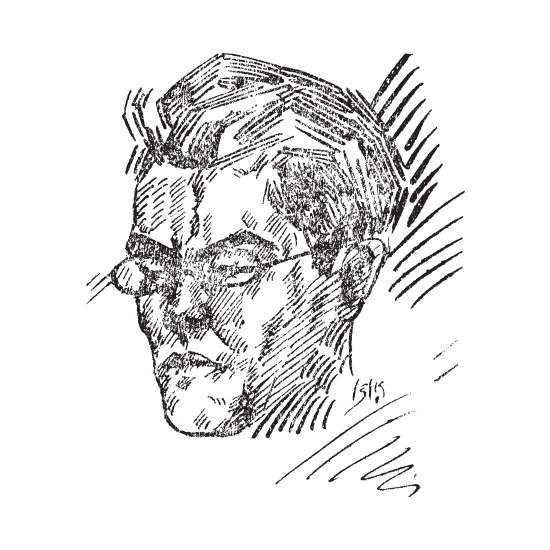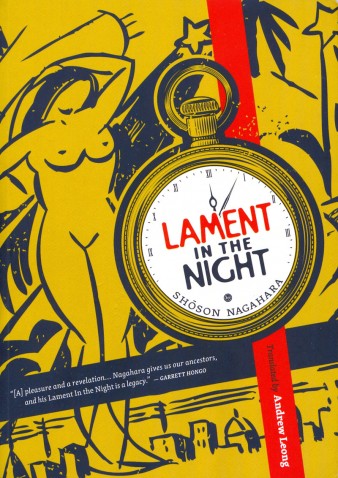Shōson Nagahara
Nagahara Shōson is the pen name of Nagahara Hideaki. We know very little about the life of Nagahara. Besides the information that we can glean from his writings, we can trace a few scattered immigration and census records. According to these records, he was born in 1900 in Yama-no-uchi-nishi-mura, a small village in northeastern Hiroshima Prefecture. Prior to coming to the United States, he lived with his paternal grandfather in Ushita-mura, which was then a northern suburb of the city of Hiroshima. He arrived in the United States at the age of seventeen in August of 1918, landing in Seattle, Washington with plans to meet his father, who was a laborer for the Utah Copper Mining Company in Magna, Utah. Sometime in the early 1920s, Nagahara moved to Los Angeles. He may have returned to Japan some time around 1927, but after 1928, the documentary trail of Nagahara goes cold. He does not appear in the 1930 census, nor does his name appear in War Relocation Authority records. His final resting place is unknown.
#ShŌson
books
Lament in the Night
Lament in the Night collects two remarkable novellas by the author Shōson Nagahara, translated from the Japanese for the first time. The title novella, originally published in 1925, follows itinerant day laborer Ishikawa Sakuzo as he prowls the back alleys and bathhouses of Los Angeles, looking for a meal, a job or just someone to hold onto. The second novella follows a young mother working her way through bars and nightclubs after being abandoned by her gambling-addicted husband. Written in a deadpan tone that is both evocative and precise, this dazzling exercise in 1920s naturalist noir promises to become a classic of American literature. This first-ever English language publication of Lament in the Night opens up a whole realm of American literature that has been woefully underpublished and unexplored–namely, the literary heritage of non-English-speaking immigrants in America. Nagahara was influenced by many Western writers–especially Knut Hamsun, whose work he translated into Japanese–and his novels combine the gritty sensibility of Los Angeles noir with elements of Japanese traditional storytelling and epistolary techniques.
praise
“Japanese American noir even before noir existed. Only Kaya Press, with fine detective work by dogged translator Andrew Leong, could have brought Shōson Nagahara’s once-buried work to 21st century readers.”
— Naomi Hirahara, Edgar Award-winning author of the Mas Arai mystery series
“Lament in the Night is a heartrending gift from the past… Little Tokyo in the 1920s—its bars, gambling, and social exchanges in an era of Prohibition—comes vividly to life in these stories, revealing the real and psychic underbelly of daily lives that have been erased and forgotten. Andrew Leong’s patient and careful translation makes a lost world known to us again.”
— Karen Tei Yamashita, author of I-Hotel
“Nagahara portrays tragedies of the ordinary—new Japanese immigrants to early 20th century Los Angeles scuffling for day jobs that pay pennies, mooching restaurant meals, exchanging frail kindnesses with others and enduring the humiliations of poverty. Nagahara’s prose is full of lyric reward as he chronicles the piteous lives of his protagonists, their homesickness for Japan and affections for each other. What emerges are revelations—that, despite oppressive lives and psychological dejection, the values that they cling to are the traditional ones of loyalty and sacrifice—giri in Japanese—even as they contend with woefully fluid, diasporic circumstances. Nagahara gives us our ancestors, and his Lament is a legacy.”
— Garret Hongo, author of Coral Road
“With his skillful translation of Shōson Nagahara’s novellas, Leong gives us a rare glimpse into the literary world of early twentieth century Japanese immigrants. Historically informed and elegantly crafted, his afterword is an excellent introduction to the lives of ordinary Issei women and men in pre-exclusion Japanese America, an aspect of the Asian American experience that has remained a conspicuous void for some time.”
— Eiichiro Azuma, author of Between Two Empires: Race, History, and Transnationalism in Japanese America
“This is not some guppy in the fishbowl of the multicultural era, when ethnic writing is factory farmed.”
— Khanh Ho, author of the Los Angeles Mystery blog
Shōson Nagahara news
For Day 28 of DTLAB’s 90 consecutive days of events, award-winning mystery writer Naomi Hirahara will host a reading by L.A.-based pulp/crime writers inspired by Kaya Press’s historical rediscovery Lament in the Night. The mysterious Friday evening will feature Christa Faust and Wally Rudolph, and fittingly, readings from the book by Shoson Nagahara. The first-ever English […]
Kaya Press celebrated Shōson Nagahara’s LAMENT IN THE NIGHT, translated into English for the first time ever by Andrew Leong, in partnership with the Japanese American National Museum, the Master of Professional Writing Program at USC, and the Huntington/USC Institute on California and the West, this past Saturday Feb. 23rd in Little Tokyo. We kicked off […]
Actors Tamlyn Tomita and Gedde Watanabe will read excerpts from the book, followed by a discussion and Q&A with LA Times Book Critic David Ulin and translator Andrew Leong. ADMISSION FOR THIS EVENT IS FREE AND OPEN TO THE PUBLIC. Reception with FREE FOOD and music by THE SADHUS OF BASS to follow immediately around the corner at FAR BAR.
Some 87 years ago, Japanese American writer Shōson Nagahara serialized a novel, A Tale of Osato, in the pages of the Rafu Shimpo—a Japanese American newspaper, which first started in Little Tokyo back in 1903. Now, for the first time ever, Nagahara’s collected writings have been translated into English and published by Kaya Press: Lament in […]


